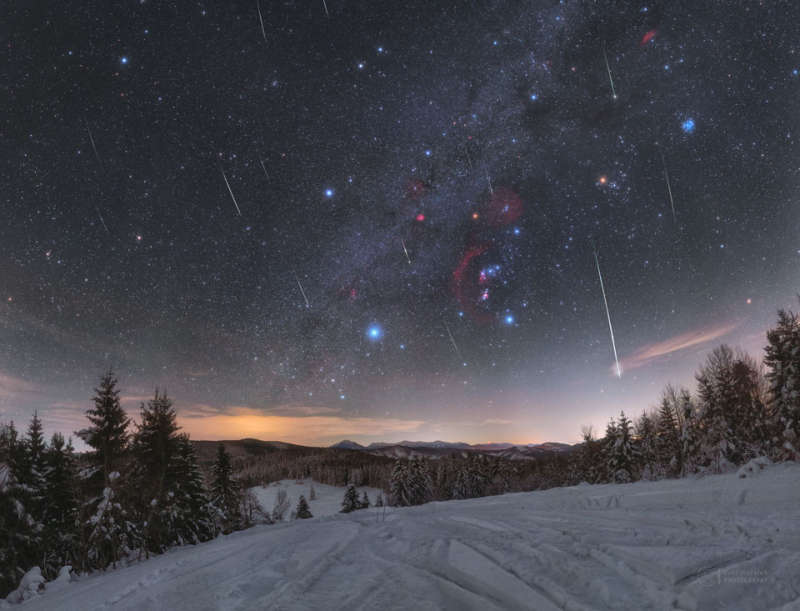
|
Credit & Copyright: Petr
Horálek
Explanation:
Why are these meteor trails nearly
parallel?
Because they were all shed by the
same space rock and so can be
traced back to the same direction on the sky: the
radiant of the
Quadrantid
Meteor Shower.
This direction used to be toward the old constellation of
Quadrans Muralis,
hence the name Quadrantids, but when the
International Astronomical Union formulated its
list of modern constellations in 1922,
this constellation
did
not make the list.
Even though the
meteors are now considered
to originate from the recognized
constellation of Bootes,
the old name stuck.
Regardless of the designation, every January the Earth moves through a
dust stream and bits of this
dust glow as meteors as they heat up in
Earth's
atmosphere.
The featured
image composite was taken on January 4 with a picturesque snowy
Slovakian
landscape in the foreground, and a
deep-exposure sky prominently featuring the constellation
Orion in the background.
The red star
Betelgeuse
appears unusually dim --
its fading over the past few months is being
tracked by astronomers.
Teachers:
APOD in the Classroom
|
January February March April May June July August September October November December |
| ||||||||||||||||||||||||||||||||||||||||||||||||
NASA Web Site Statements, Warnings, and Disclaimers
NASA Official: Jay Norris. Specific rights apply.
A service of: LHEA at NASA / GSFC
& Michigan Tech. U.
Based on Astronomy Picture
Of the Day
Publications with keywords: meteor shower - Orion
Publications with words: meteor shower - Orion
See also:
- APOD: 2026 March 2 Á The Dusty Surroundings of Orion and the Pleiades
- APOD: 2026 February 18 Á Orions Cradle
- APOD: 2026 February 2 Á Orion: The Running Man Nebula
- APOD: 2026 January 28 Á M78: Reflecting Blue in a Sea of Red
- APOD: 2026 January 27 Á Orions Treasures over Snowy Mountains
- LDN 1622: Dark Nebula in Orion
- APOD: 2025 December 15 Á Gemini Meteors over Snow Capped Mountains
